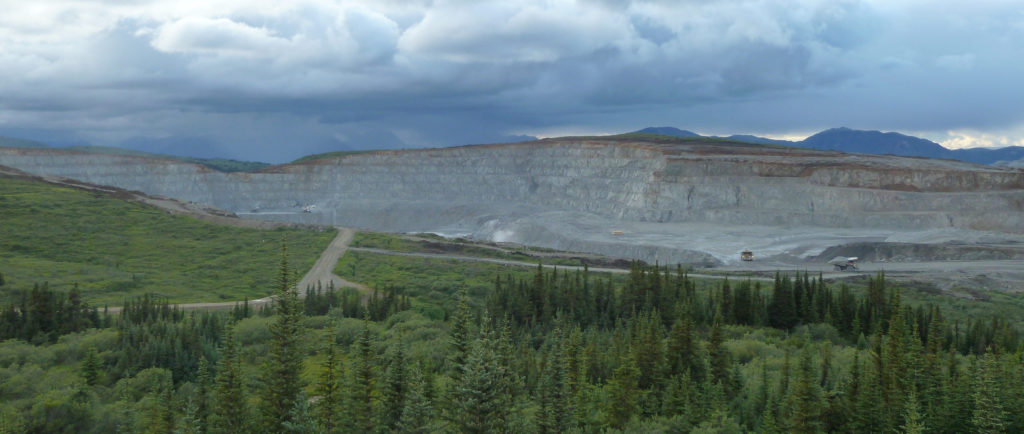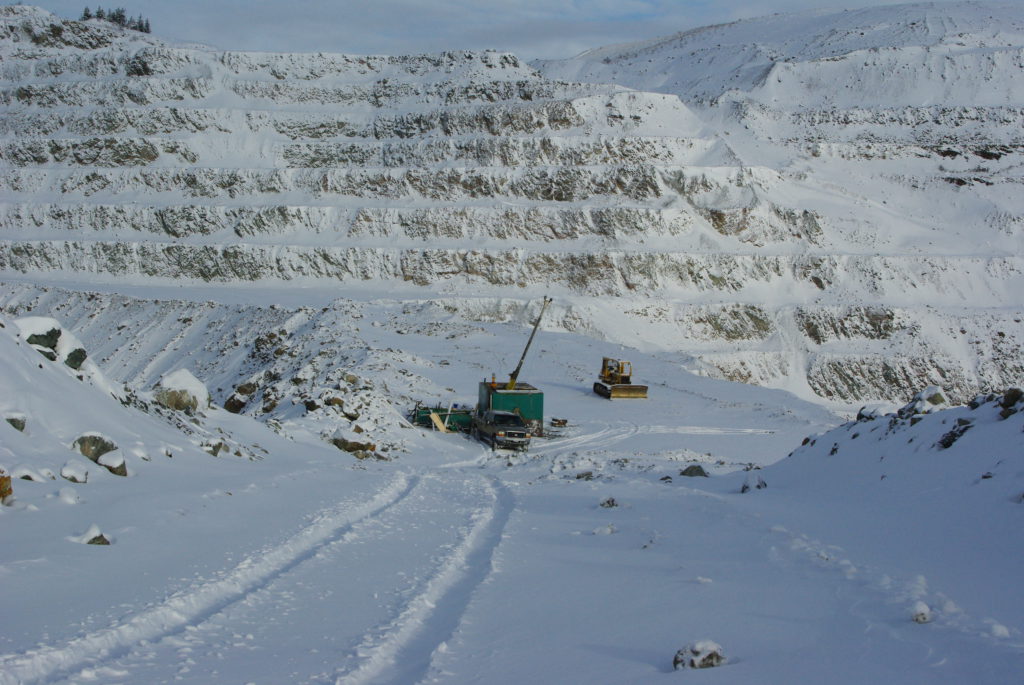Jackson Chen | August 9, 2022 |

A feasibility study for the Red Chris underground is expected early next year.
Credit: Imperial Metals
Imperial Metals (TSX: III) racked up further losses during the second quarter of 2022, recording an adjusted net loss of $29.3 million compared with $5.1 million for the 2021 comparative quarter. This was despite a slight revenue increase of $2.2 million from the second quarter 2021.

Contributors to the higher net loss include a $1.4 million decline in mine operations income, over $30 million of spending on the Mount Polley mine restart, a $4.6 million rise in idle mine costs, and an additional $3.5 million in tax recovery. Capital expenditures including leases also rose to $39.6 million in the June 2022 quarter, up from $23.8 million in the 2021 comparative quarter.
Imperial’s mining operations, specifically the Red Chris mine that is 70% owned by Newcrest Mining, helped to lift up the company’s revenue in the second quarter 2022. Metal production from the northwest B.C. mine totalled 22 million lb. of copper and 19,540 oz. of gold, which respectively were 25.2% and 26.5% higher than the 2021 quarter.
Exploration drilling at Red Chris remains underway, with up to eight drills in operation during the second quarter, focusing on expanding the East Ridge zone and gathering geotechnical information for infrastructure related to the development of a block cave. The exploration decline had advanced 1,717 metres as of July 20, 2022. Work on the block cave feasibility study is ongoing and is targeted to be released in the first half of 2023.
At Mount Polley, Imperial first began the required work to reopen the copper-gold mine during the fourth quarter of 2021. Initial mill commissioning and operations began on June 25, 2022. Commissioning work continues into the third quarter, with six of the eight mills in the grinding circuit now in operation. During the second quarter, 62,775 tonnes were milled and 6.3 million tonnes were mined, achieving a day rate of 69,013 t/d. By the end of the second quarter, approximately 1.3 million tonnes had been stockpiled for future milling.
The restart of the facilities took approximately three months longer than planned due to difficulties in hiring operating personnel, certain supply chain challenges and unanticipated electrical and mechanical work that needed to be completed in order to get the plant operating. Also, the failure of a key electrical component two weeks after the restart of mill operations caused a 10-day delay in the ramp up of mill operations. As a result, Imperial has sought additional funding for the Mount Polley restart budget.
Additional information about the Mount Polley mine restart is posted on www.ImperialMetals.com.
Imperial Metals (TSX: III) racked up further losses during the second quarter of 2022, recording an adjusted net loss of $29.3 million compared with $5.1 million for the 2021 comparative quarter. This was despite a slight revenue increase of $2.2 million from the second quarter 2021.

Contributors to the higher net loss include a $1.4 million decline in mine operations income, over $30 million of spending on the Mount Polley mine restart, a $4.6 million rise in idle mine costs, and an additional $3.5 million in tax recovery. Capital expenditures including leases also rose to $39.6 million in the June 2022 quarter, up from $23.8 million in the 2021 comparative quarter.
Imperial’s mining operations, specifically the Red Chris mine that is 70% owned by Newcrest Mining, helped to lift up the company’s revenue in the second quarter 2022. Metal production from the northwest B.C. mine totalled 22 million lb. of copper and 19,540 oz. of gold, which respectively were 25.2% and 26.5% higher than the 2021 quarter.
Exploration drilling at Red Chris remains underway, with up to eight drills in operation during the second quarter, focusing on expanding the East Ridge zone and gathering geotechnical information for infrastructure related to the development of a block cave. The exploration decline had advanced 1,717 metres as of July 20, 2022. Work on the block cave feasibility study is ongoing and is targeted to be released in the first half of 2023.
At Mount Polley, Imperial first began the required work to reopen the copper-gold mine during the fourth quarter of 2021. Initial mill commissioning and operations began on June 25, 2022. Commissioning work continues into the third quarter, with six of the eight mills in the grinding circuit now in operation. During the second quarter, 62,775 tonnes were milled and 6.3 million tonnes were mined, achieving a day rate of 69,013 t/d. By the end of the second quarter, approximately 1.3 million tonnes had been stockpiled for future milling.
The restart of the facilities took approximately three months longer than planned due to difficulties in hiring operating personnel, certain supply chain challenges and unanticipated electrical and mechanical work that needed to be completed in order to get the plant operating. Also, the failure of a key electrical component two weeks after the restart of mill operations caused a 10-day delay in the ramp up of mill operations. As a result, Imperial has sought additional funding for the Mount Polley restart budget.
Additional information about the Mount Polley mine restart is posted on www.ImperialMetals.com.
Imperial Metals’ Mount Polley restart facing budget shortfall
Staff Writer | August 8, 2022 |

Credit: Imperial Metals
Imperial Metals (TSX: III) said it intends to secure additional financing for the restart of its Mount Polley mine by way of a convertible debenture financing totalling C$45 million ($35m).

The Mount Polley mine, which has been on care and maintenance since 2019, is currently operating at targeted production rates. The company had previously aimed to reopen the mine operation by the end of June.
However, the mine restart took longer than planned due to difficulties in hiring operating personnel, supply chain challenges and unanticipated electrical and mechanical work. This, together with lower copper prices, caused a shortfall in revenues compared to budget. In addition, Imperial Metals’ previously announced rights offering was not fully subscribed, resulting in a shortfall in budgeted equity financing. Due to these reasons, the company is now seeking additional funding via debt financing.
The convertible debentures will have a five-year term ending August 31, 2027. Each C$3.20 of the principal amount will be convertible into one common share of Imperial Metals. Up to 14.06 million common shares are expected to be issued if all the convertible debentures issuable were converted.
Murray Edwards, the company’s largest shareholder, has advised that he intends to purchase between C$30 million and C$35 million of the debentures.
Located about 56 km northeast of Williams Lake in south-central British Columbia, the Mount Polley copper-gold underground mine was first shut down in 2014 after a massive tailings pond collapse. Imperial Metals had to rebuild the mine’s tailings and spent more than C$70 million in environmental rehabilitation. Operations resumed two years later, but was halted again in 2019 due to a slump in copper prices.
Aiming to restart the operation once again, Imperial Metals has spent around C$22.4 million in one year, dating back to the end of the March 2021 quarter. This includes C$21.7 million in operating costs and C$700,000 in depreciation expense. Exploration, development and capital expenditures on Mount Polley rose by C$2 million in the March 2022 quarter in comparison to the 2021 quarter.
In the week following the repair of a key electrical component on July 27, the concentrator at Mount Polley produced concentrate containing approximately 336,000 lb. of copper and 550 oz. of gold against the budget for the initial week following start-up of 188,403 lb. of copper and 495 oz. of gold.

Credit: Imperial Metals
Imperial Metals (TSX: III) said it intends to secure additional financing for the restart of its Mount Polley mine by way of a convertible debenture financing totalling C$45 million ($35m).

The Mount Polley mine, which has been on care and maintenance since 2019, is currently operating at targeted production rates. The company had previously aimed to reopen the mine operation by the end of June.
However, the mine restart took longer than planned due to difficulties in hiring operating personnel, supply chain challenges and unanticipated electrical and mechanical work. This, together with lower copper prices, caused a shortfall in revenues compared to budget. In addition, Imperial Metals’ previously announced rights offering was not fully subscribed, resulting in a shortfall in budgeted equity financing. Due to these reasons, the company is now seeking additional funding via debt financing.
The convertible debentures will have a five-year term ending August 31, 2027. Each C$3.20 of the principal amount will be convertible into one common share of Imperial Metals. Up to 14.06 million common shares are expected to be issued if all the convertible debentures issuable were converted.
Murray Edwards, the company’s largest shareholder, has advised that he intends to purchase between C$30 million and C$35 million of the debentures.
Located about 56 km northeast of Williams Lake in south-central British Columbia, the Mount Polley copper-gold underground mine was first shut down in 2014 after a massive tailings pond collapse. Imperial Metals had to rebuild the mine’s tailings and spent more than C$70 million in environmental rehabilitation. Operations resumed two years later, but was halted again in 2019 due to a slump in copper prices.
Aiming to restart the operation once again, Imperial Metals has spent around C$22.4 million in one year, dating back to the end of the March 2021 quarter. This includes C$21.7 million in operating costs and C$700,000 in depreciation expense. Exploration, development and capital expenditures on Mount Polley rose by C$2 million in the March 2022 quarter in comparison to the 2021 quarter.
In the week following the repair of a key electrical component on July 27, the concentrator at Mount Polley produced concentrate containing approximately 336,000 lb. of copper and 550 oz. of gold against the budget for the initial week following start-up of 188,403 lb. of copper and 495 oz. of gold.
No comments:
Post a Comment